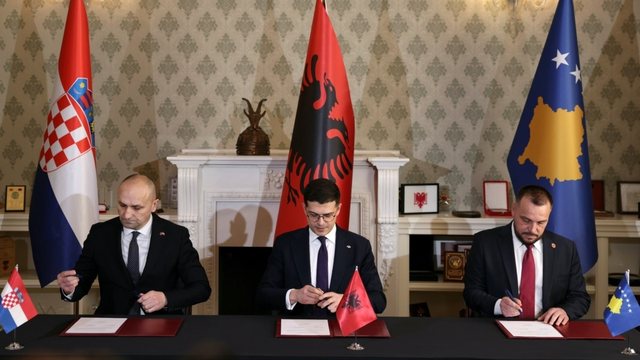
 Flash News
Flash News
What does the declaration on military cooperation between Kosovo, Albania and Croatia contain, which angered Serbia?

Exploring the development and acquisition of defense capabilities through multinational cooperation, sharing best practices in recruiting, developing, and retaining personnel to enhance deterrence and defense capabilities, joint exercises, strengthening countermeasures against hybrid threats, sharing intelligence for deterrence, and supporting Kosovo in obtaining its status in NATO's Partnership for Peace.
These are some of the points included in the declaration of cooperation in the field of defense and security that the Defense Ministers of Kosovo, Albania and Croatia signed on March 18 in Tirana.
The full agreement was published by Albania's Defense Minister, Pirro Vengu, on March 22, who wrote in X that in its history, Tirana has no precedent for secret agreements or treaties to the detriment of its neighbors, "as other states have had."
"Serbia, having pursued an empty-chair policy in regional initiatives for two years, has unilaterally suspended itself from the opportunity to promote or participate in multilateral consultations. This suspension, which it is up to Serbia to set aside, renders futile any victimization narrative coming from the Serbian government," he wrote.
The full text of the statement was later published by the Kosovo Ministry of Defense.
Minister Vengu said that the agreement aims to fulfill the ambitions arising from NATO's strategic concept and relies on increasing cooperation and industrial defense production based on the alliance's commitment to industrial expansion and the European Union's plan for the Rearmament of Europe.
The agreement on the field of security and defense between Kosovo and two NATO member states, Albania and Croatia, has four points.
The first point concerns the promotion of defense capabilities and cooperation in the relevant industry.
It states that the three countries will explore the development and acquisition of defense capabilities through multinational cooperation, in order to increase the readiness of their military forces. Kosovo, Albania and Croatia also pledge to identify areas for cooperation in the defense industry, promoting access to resources and supply chains in order to have a competitive and sustainable defense industry.
This point of the agreement also foresees investment in new technologies and innovations in order to have a unified approach to the transformation of security and defense.
Pika e dytë adreson rritjen e ndërveprueshmërisë, përmes edukimit, trajnimeve dhe stërvitjeve. Aty thuhet se do të ndahen praktikat më të mira të rekrutimit, zhvillimit dhe mbajtjes së personelit të kualifikuar ushtarak me qëllim që të rriten kapacitetet parandaluese dhe mbrojtëse.
Po ashtu, aty parashihet mundësia e edukimit dhe trajnimit individual përmes akademive dhe kolegjeve përkatëse të shteteve, “me qëllim që të ketë kuptueshmëri më të mirë nga ana strategjike të kërcënimeve dhe sfidave të përbashkëta”.
Marrëveshja parasheh stërvitje dypalëshe dhe trepalëshe për të përmirësuar ndërveprueshmërinë në bazë të politikave të NATO-s dhe BE-së, me qëllim që forcat e tyre ushtarake të jenë të përgatitura në mënyrë adekuate.
*Video: Pse Serbia po shqetësohet nga bashkëpunimi ushtarak mes Kosovës dhe shteteve fqinje?
Pika tre përqendrohet në kundërpërgjigjen ndaj kërcënimeve hibride. Shtetet janë zotuar se do të forcojnë hapat e përbashkët për t’iu përgjigjur kërcënimeve hibride, përfshirë kërcënimeve kibernetike, fushatave të dezinformimit si dhe “dikimin dashakeq të huaj që mund të komprometojë ose të ndikojë në sigurinë kombëtare dhe rajonale”.
Në këtë fushë përfshihet këmbimi i informacioneve të inteligjencës për koordinim strategjik dhe operacional mes institucioneve të mbrojtjes “për të parandaluar, zbuluar dhe reaguar në mënyrë efektive kundër sfidave që hasin vendet tona përkatëse”.
Po ashtu, Kosova, Shqipëria dhe Kroacia kanë thënë se do të eksplorojnë mundësitë e reagimit për një sërë kërcënimesh të mundshme ndaj infrastrukturës së tyre kritike.
Dhe pika e fundit e marrëveshjes flet për mbështetjen që shtetet do të ofrojnë për integrimin euroatlantik. Këtu përfshihet përafrimi i politikave me institucionet dhe strukturat euroatlantike të sigurisë dhe mbrojtjes.
Shtetet janë zotuar se do të bashkëpunojnë për integrimin e plotë të Kosovës në nismat rajonale të sigurisë dhe mbrojtjes si dhe të pranimit në Programin për Partneritet për Paqe të NATO-s.
Serbia e ka kritikuar nismën e bashkëpunimit mes tri vendeve, duke e parë si kërcënim për “integritetin terrorial të saj”. Beogradi, që menjëherë kërkuar shpjegim nga Zagrebi dhe Tirana për qëllimet e nismës, po ashtu ka akuzuar dy shtetet për nisje të një gare armatimi në rajon.
Kosova, ndërkaq, ka thënë se nisma për bashkëpunim do t’i kontribuojë paqes dhe stabilitetit në rajon dhe nuk duhet të shihet si kërcënim ndaj askujt, por po ashtu duhet të merret edhe si mesazh se tri shtetet do të jenë të bashkuara përballë çfarëdo sfide apo kërcënimi.
Ministria e Punëve të Jashtme dhe Diasporës e Kosovës i ka cilësuar kundërshtimet e Serbisë për nismën e bashkëpunimit të mbrojtjes si "shkelje të hapur të Marrëveshjeve të Brukselit", e cila, sipas MPJD-së, "parashikon qartë se Serbia nuk do të pengojë marrëdhëniet ndërkombëtare të Kosovës dhe nuk do të pretendojë të flasë në emër të Kosovës në marrëdhëniet me shtete dhe organizata të tjera".
"Serbia's attempt to present itself as a 'guarantor of peace in the Balkans' is absurd. No state in the region and beyond has contributed more to the destabilization of the Western Balkans than Serbia, as historical facts and recent developments prove," the MFA said on March 19.
Croatia has responded to Serbia's criticism, saying that the time has passed when Zagreb sought permission from Belgrade on how to act and with whom to cooperate.
The Defense Ministers of Kosovo, Albania, and Croatia have said that the initiative could be expanded to other countries, mentioning the possibility of Bulgaria becoming part of it.
Meanwhile, Montenegro has said that it was not invited to become part of the declaration on cooperation in the field of security and defense.
Security experts have seen the initiative as a step towards strengthening alternatives or strategic alliances for Kosovo to advance in terms of defense. However, they do not see it as a step towards forming a formal defense alliance, such as NATO .
Latest news


Not only the body, swimming also helps the brain
2025-07-05 21:02:49
"Be careful with the water", Alimehmeti warns about the health risks of summer
2025-07-05 20:39:10
PSG beats Bayern Munich 2-0, advances to Club World Cup semifinals
2025-07-05 20:19:38

Two vehicles collide on the Elbasan-Peqin axis, drivers injured
2025-07-05 19:26:29

What does Zelenskyy have more than Zegjineja?
2025-07-05 18:45:26

Fiscal peace, but at a cost
2025-07-05 18:00:10
'Bankers' tax evasion, Chinese CEO and former director jailed
2025-07-05 17:39:21
Kyle Walker joins English club on two-year deal
2025-07-05 17:20:24
Two cars collide on the Saranda-Delvina axis, 4 injured
2025-07-05 17:05:29
Touching gesture! Liverpool will pay Jota's family's salary until 2027
2025-07-05 16:45:18
The zodiac signs that cheat most often
2025-07-05 16:25:53

"I asked for the dismissals", Dredha tries to soften Rama's 'blow' in Vlora
2025-07-05 15:48:49
Bomb threat in Parliament, prosecutor: It was a lie
2025-07-05 15:22:28

Bardhi: The recount revealed how greedy Zeqine Balluku is in stealing
2025-07-05 14:44:29
Knife wound on the secondary road Tirana-Durrës, perpetrator sought
2025-07-05 14:37:54
Tears and pain, Diogo Jota is escorted to his final home
2025-07-05 14:21:34
Success starts with yourself! Simple ways to invest in personal development
2025-07-05 13:58:50
Unlicensed firearms found in apartment, 50-year-old arrested in Lushnje
2025-07-05 13:43:11

Tirana Court remands Skerdi Sina to prison
2025-07-05 12:59:34
Cocaine laboratory in Greece, here are the Albanians arrested and wanted
2025-07-05 12:40:16
Directed Justice/Vangjeli: SPAK does not investigate any scandal involving Rama
2025-07-05 12:22:03

Bomb alert, Police remove MPs and media from Kosovo Parliament building
2025-07-05 11:48:16
"The will of the people" and the irony of ordered resignations
2025-07-05 11:32:05
Summer drowning risk: How to enjoy the water without risking your life
2025-07-05 11:20:27
Fire situation in the country, 16 fires reported in 24 hours, 4 still active
2025-07-05 11:07:04
Car hits pedestrian at white lines, injured in serious condition in Vlora
2025-07-05 10:59:58
Mosquito-borne diseases are a growing problem in Europe
2025-07-05 10:44:13



One of Sweden's most dangerous and wanted criminals arrested in Turkey
2025-07-05 09:38:29
Foreign exchange/ How much foreign currencies are bought and sold today
2025-07-05 09:18:38

"Don't be influenced by the opinions of others", today's horoscope
2025-07-05 08:40:50

Morning Post/ In 2 lines: What mattered yesterday in Albania
2025-07-05 08:02:07

Trump says he's ready to raise tariffs to 70% on some countries
2025-07-04 22:35:52
Tre shenjat e zodiakut që do ‘pasurohen’ në Korrik
2025-07-04 22:05:09
Gaza War: Hamas Accepts US Proposal for 60-Day Ceasefire
2025-07-04 21:50:10
Autocracy in Albania, Fuga: Governance has gotten out of control
2025-07-04 21:40:51
Meta: Agriculture on credit, the new fraud!
2025-07-04 21:26:39




Vote recount in Durrës ends without changes
2025-07-04 20:12:54
Gas station explodes in Rome, 25 injured (VIDEO)
2025-07-04 20:00:20

These afternoon habits often sabotage weight loss
2025-07-04 19:39:28
Former Arsenal player Thomas Partey accused of rape
2025-07-04 19:24:21
Shepherd disappears without a trace in Delvina
2025-07-04 19:14:31

Bardho gave Zegjine's mandate/Braho: Unfair! It violates the electoral system
2025-07-04 19:01:08


Rapid developments in the Sultanates!
2025-07-04 18:00:06



Italy tightens rules for skateboard traffic
2025-07-04 17:20:18

Unusual for the time, dense fog covers the coast of Vlora
2025-07-04 16:48:01


Accident on the Shkodra-Lezhë axis, one dead and 3 injured
2025-07-04 16:14:19
Albania with fewer requests for asylum and Albanian citizenship in 2024
2025-07-04 16:06:57

Albania last for quality of life, DP: Technical government is the solution!
2025-07-04 15:42:30
Nico Williams says "No" to Barcelona, signs with Athletic Club until 2035
2025-07-04 15:33:35
Fires in the country, four fires are still active, what is the situation?
2025-07-04 15:24:20

Summer brings big changes for these 4 zodiac signs
2025-07-04 15:00:04
Osmani: MPs need to agree to a secret ballot for the Speaker of Parliament
2025-07-04 14:51:09
Serious accident on the Peqin-Elbasan axis, two injured
2025-07-04 14:37:56

GJKKO leaves in force the security measure for the head of the KPP
2025-07-04 13:58:17
Who will replace Ilir Meta and take over the leadership of the PL?
2025-07-04 13:50:36
Berisha: Dismissal of directors in Vlora, another act of 'scapegoats'
2025-07-04 13:41:46




Librazhd/ In a serious psychological state, the young man consumes pesticides
2025-07-04 13:05:07


Weapons trafficked from Kosovo to Albania, two arrested, 8 pistols seized
2025-07-04 12:33:28
Konsumimi i tepërt i çokollatës, ja cilat janë dëmet që shkakton në organizëm
2025-07-04 12:23:35

Fires in the country, 21 fires in the last 24 hours, 4 still active
2025-07-04 12:00:19
WB calls for debt transparency: Albania to publish details of every loan
2025-07-04 11:50:05
